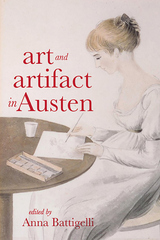
Published by University of Delaware Press. Distributed worldwide by Rutgers University Press.

Francis James Child, compiler and editor of the monumental English and Scottish Popular Ballads, established the scholarly study of folk ballads in the English-speaking world. His successors at Harvard University, notably George Lyman Kittredge, Milman Parry, and Albert B. Lord, discovered new ways of relating ideas about sung narrative to the study of epic poetry and what has come to be called—though not without controversy—“oral literature.”
In this volume, sixteen distinguished scholars from Europe and the United States offer original essays in the spirit of these pioneers. The topics of their studies include well-known “Child Ballads” in their British and American forms; aspects of the oral literatures of France, Ireland, Scandinavia, medieval England, ancient Greece, and modern Egypt; and recent literary ballads and popular songs. Many of the essays evince a concern with the theoretical underpinnings of the study of folklore and literature, orality and literacy; and as a whole the volume reestablishes the European ballad in the wider context of oral literature. Among the contributors are Albert B. Lord, Bengt R. Jonsson, Gregory Nagy, David Buchan, Vesteinn Olason, and Karl Reichl.

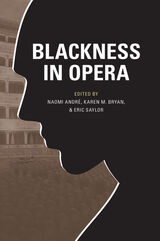


Much as abortion in the United States today is a contentious issue used for scripting women's roles and potential into the national agenda, divorce was an issue dividing England in the Edwardian era. According to Janice Harris, anything and everything, from illicit sex and family values to the Garden of Eden, wrath of children, poverty of women, nature of cruelty, scandal of America, threat of Germany, and future of England were part of the debate over divorce. Living under marriage laws far more restrictive than those of their Protestant neighbors, Edwardian women and men campaigned for reform with a barrage of compelling stories. Organizing her analysis around three major sources of narrative on divorce––the Sunday papers, the Report of the Royal Commission on Divorce and Matrimonial causes, and the novel––Harris uncovers a war of words and a competition of tales. In raising questions about the winners, losers, and spoils, Harris expands our understanding of the history of divorce, the wars between the sexes, and the political import of those wars.
In the end, she presents a complex and lively story herself, one that illuminates battles over marriage and divorce taking place in our own era as well. This humane book on a long-neglected subject marks an important contribution to narrative studies and Edwardian history.
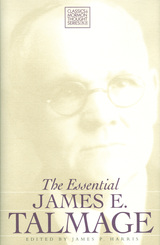
This was not the first time that Talmage had been of service to his church. As a geology professor, he was consulted about underground ventilation options for the Salt Lake Tabernacle and about the scientific evidence for organic evolution, which he cautiously promoted. At the church president’s request, Talmage also delivered a series of lectures on church theology which would form the basis for his later influential books.
Not that Talmage was unaccustomed to controversy. When his book, The Articles of Faith, first appeared, he was accused of “apostasy” and narrowly escaped church sanction. When he read from an advance text of Jesus the Christ in general conference, some leaders objected to the doctrinal content and had the offending paragraphs excised from the published conference proceedings.
Scholars have noted that much of Talmage’s work reflects the thinking of his day, particularly in his reliance on Frederick Farrar’s Life of Christ and in his portrayal of a so-called “Victorian Jesus.” But as James P. Harris observes, Talmage also “supplemented the biblical narrative with modern revelation” and produced “a source of information and inspiration to church members worldwide.”
The Essential James E. Talmage includes some of the apostle’s lesser-known works. For Talmage’s more popular writings, the editor has included relevant diary entries and material omitted from later editions. Readers will appreciate the process by which these seminal works were produced and the character of the man who composed them.
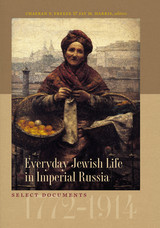

This volume presents essays by some of the leading figures in the vanguard of theoretical linguistics within the framework of universal grammmar. One of the first books to adopt the "minimalist" framework to syntactic analysis, it includes a central essay by Noam Chomsky on the minimalist program and covers a range of topics in syntax and morphology.
Contributors: Luigi Burzio, Héctor Campos, Noam Chomsky, Joseph E. Emonds, Robert Freidin, James Harris, Ray Jackendoff, Paula Kempchinsky, Howard Lasnik, Claudia Parodi, Carlos Piera, A. Carlos Quicoli, Dominique Sportiche, Esther Torrego.
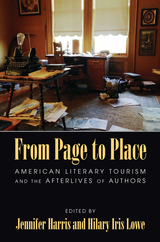
In addition to the editors, contributors include Rebecca Rego Barry, Susann Bishop, Ben de Bruyn, Erin Hazard, Caroline Hellman, Michelle McClellan, Mara Scanlon, and Klara-Stephanie Szlezák.
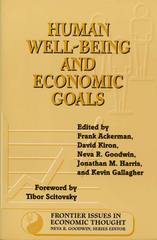
What are the ends of economic activity? According to neoclassical theory, efficient interaction of the profit-maximizing "ideal producer" and the utility-maximizing "ideal consumer" will eventually lead to some sort of social optimum. But is that social optimum the same as human well-being? Human Well-Being and Economic Goals addresses that issue, considering such questions as:
- Does the maximization of individual welfare really lead to social welfare?
- How can we deal with questions of relative welfare and of equity?
- How do we define, or at least understand, individual and social welfare?
- And how can these things be measured, or even assessed?
Human Well-Being and Economic Goals brings together more than 75 concise summaries of the most significant literature in the field that consider issues of present and future individual and social welfare, national development, consumption, and equity. Like its predecessors in the Frontier Issues in Economic Thought series, it takes a multidisciplinary approach to economic concerns, examining their sociological, philosophical, and psychological aspects and implications as well as their economic underpinnings.
Human Well-Being and Economic Goals provides a powerful introduction to the current and historical writings that examine the concept of human well-being in ways that can help us to set goals for economic activity and judge its success. It is a valuable summary and overview for students, economists, and social scientists concerned with these issues.

Moses Maimonides was the most significant Jewish thinker, jurist, and doctor of the Middle Ages. Author of both a monumental code of Jewish law and the most influential and controversial work of Jewish philosophy, Maimonides looms larger than any other figure in the Jewish Middle Ages.
The essays in this volume were written to mark the 800th anniversary of Maimonides’s death in 1204. Written by the leading scholars in the field, they cover all aspects of Maimonides’s work and infuence. From his work on Jewish law to his unique understanding of God; from his view of the soul to his understanding of other religions; from his influence on Jewish scholars in the eastern Mediterranean to his impact on the emergence of modern Judaism—the essays in this volume cover all this and more. It is an indispensable collection for all those interested in the history of Judaism over the last 800 years.
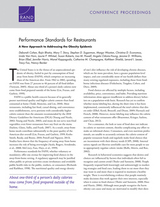

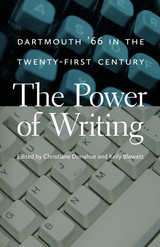

Jacob Katz (1904–1998) was one of the greatest Jewish historians of the twentieth century. A pioneer of new foci and methods, Katz brought extraordinary insights to many aspects of Jewish life and its surrounding contexts.
With a keen eye for both “forests” and “trees,” Katz transformed our understanding of many areas of Jewish history, among them: Jewish-Christian relations in the Middle Ages, the social-historical significance of Jewish law, the rise of Orthodoxy in Germany and Hungary, and the emergence of modern anti-Semitism. In this volume, ten leading scholars critically discuss Katz’s work with an appreciation for Katz’s importance in reshaping the way Jewish history is studied.

The biblical commentaries of Rabbi Abraham ibn Ezra (1089/1092–1164/1167) have become indispensable to anyone desiring a full appreciation of the biblical text, and this noted scholar also wrote extensively on philology, philosophy, mathematics, and astrology. The six essays in this book explore ibn Ezra’s multifaceted work and intellectual legacy. They illuminate his exegetical methodology; the role of astrology in his work; his philological insights into the Hebrew language; the possibility of his influence on the great Jewish philosopher and jurist, Maimonides; the numerous supercommentaries called forth by his enigmatic commentary; and modern Jewish perspectives on him.
Contributors are Jay M. Harris, Simhah Kogut, Y. Tzvi Langermann, Nahum Sarna, Uriel Simon, and Isadore Twersky. Two of the essays are in Hebrew.

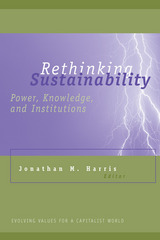
Any theory of sustainable development must take into account economic, social, and environmental dimensions. Until recently, the question "What is development?" was often answered predominantly from the economist's perspective, with high priority being assigned to expansion of economic output. Social, political, institutional, and ethical aspects have often been neglected. But now that sustainable development has become a broadly accepted concept, it is impossible to maintain a narrowly economistic view of development. For this reason, the varied perspectives offered by the contributors to this volume are crucial to understanding the process of development as it relates to environmental sustainability and human well-being.
The selection of articles is meant to be stimulating and provocative rather than comp-rehensive. They are roughly divided between those dealing with broad theoretical issues concerning the economic, political, and social aspects of development (Part I) and those presenting more applied analysis (Part II). The common thread is a concern for examining which factors contribute to making development socially just and environmentally sound.
Rethinking Sustainability will be of interest to economists and social scientists, development professionals, and instructors seeking to offer their students a broad perspective on development issues.
Jonathan Harris is Senior Research Associate, Global Development and Environment Institute at Tufts University, as well as Adjunct Associate Professor of International Economics at Tufts University Fletcher School of Law.
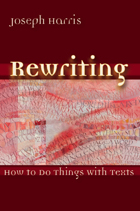
"Like all writers, intellectuals need to say something new and say it well. But unlike many other writers, what intellectuals have to say is bound up with the books we are reading . . . and the ideas of the people we are talking with."
What are the moves that an academic writer makes? How does writing as an intellectual change the way we work from sources? In Rewriting, a textbook for the undergraduate classroom, Joseph Harris draws the college writing student away from static ideas of thesis, support, and structure, and toward a more mature and dynamic understanding. Harris wants college writers to think of intellectual writing as an adaptive and social activity, and he offers them a clear set of strategies—a set of moves—for participating in it.
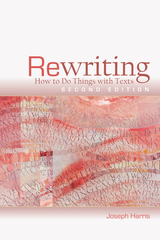
“Like all writers, intellectuals need to say something new and say it well. But for intellectuals, unlike many other writers, what we have to say is bound up with the books we are reading . . . and the ideas of the people we are talking with.”
What are the moves that an academic writer makes? How does writing as an intellectual change the way we work from sources? In Rewriting, Joseph Harris draws the college writing student away from static ideas of thesis, support, and structure, and toward a more mature and dynamic understanding. Harris wants college writers to think of intellectual writing as an adaptive and social activity, and he offers them a clear set of strategies—a set of moves—for participating in it. The second edition introduces remixing as an additional signature move and is updated with new attention to digital writing, which both extends and rethinks the ideas of earlier chapters.

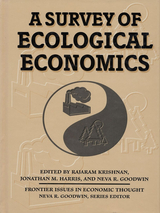
The emergent discipline of ecological economics is based on the idea that the world's economies are a function of the earth's ecosystems -- an idea that radically reverses the world view of neoclassical economics. A Survey of Ecological Economics provides the first overview of this new field, and a comprehensive and systematic survey of its critical literature.
The editors of the volume summarize ninety-five seminal articles, selected through an exhaustive survey, that advance the field of ecological economics and represent the best thinking to date in the area. Each two- to three-page summary is far more comprehensive than a typical abstract, and presents both the topics covered in each paper and the most important arguments made about each topic. Sections cover:
- historical perspective
- definition, scope, and interdisciplinary issues
- theoretical frameworks and techniques
- energy and resource flow analysis
- accounting and evaluation
- North-South/international issues
- ethical/social/institutional issues
A Survey of Ecological Economics is the first volume in the Frontier Issues in Economic Thought series produced by the Global Development And Environment Institute at Tufts University.
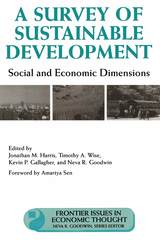
Perpetual economic growth is physically impossible on a planet with finite resources. Many concerned with humanity's future have focused on the concept of "sustainable development" as an alternative, as they seek means of achieving current economic and social goals without compromising the ability of future generations to meet their own goals. Sustainable development brings together elements of economics, public policy, sociology, ecology, resource management, and other related areas, and while the term has become quite popular, it is rarely defined, and even less often is it understood.
A Survey of Sustainable Development addresses that problem by bringing together in a single volume the most important works on sustainable human and economic development. It offers a broad overview of the subject, and gives the reader a quick and thorough guide to this highly diffuse topic. The volume offers ten sections on topics including:
- economic and social dimensions of sustainable development
- the North/South balance
- population and the demographic transition
- agriculture and renewable resources
- energy and materials use
- globalization and corporate responsibility
- local and national strategies
Each section is introduced with an essay by one of the volume editors that provides an overview of the subject and a summary of the mainstream literature, followed by two- to three-page abstracts of the most important articles or book chapters on the topic.
A Survey of Sustainable Development is the sixth and final volume in the Frontier Issues of Economic Thought series produced by the Global Development And Environment Institute at Tufts University. Each book brings together the most important articles and book chapters in a "frontier" area of economics where important new work is being done but has not yet been incorporated into the mainstream of economic study. The book is an essential reference for students and scholars concerned with economics, environmental studies, public policy and administration, international development, and a broad range of related fields.
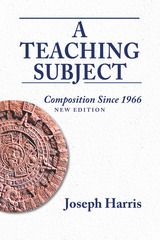
In this classic text, Joseph Harris traces the evolution of college writing instruction since the Dartmouth Seminar of 1966. A Teaching Subject offers a brilliant interpretive history of the first decades during which writing studies came to be imagined as a discipline separable from its partners in English studies. Postscripts to each chapter in this new edition bring the history of composition up to the present.
Reviewing the development of the field through five key ideas, Harris unfolds a set of issues and tensions that continue to shape the teaching of writing today. Ultimately, he builds a case, now deeply influential in its own right, that composition defines itself through its interest and investment in the literacy work that students and teachers do together. Unique among English studies fields, composition is, Harris contends, a teaching subject.
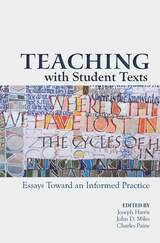
Harris, Miles and Paine ask: What happens when the texts that students write become the focus of a writing course? In response, a distinguished group of scholar/teachers suggests that teaching with students texts is not simply a classroom technique, but a way of working with writing that defines composition as a field.
In Teaching with Student Texts, authors discuss ways of revaluing student writing as intellectual work, of circulating student texts in the classroom and beyond, and of changing our classroom practices by bringing student writings to the table. Together, these essays articulate a variety of ways that student texts can take a central place in classroom work and can, in the process, redefine the ways our field talks about writing.
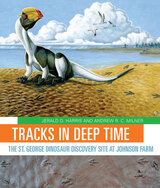
Tracks in Deep Time presents, for the first time, an engaging, thoroughly readable account of the history, geology, and paleontology of this important site. Two hundred million years ago, Lake Dixie covered the site. Within its waters and along its shores, a diverse ecosystem of dinosaurs, early crocodylians, fishes, plants, and other organisms thrived, leaving behind thousands of footprints and other fossils preserved in layers of rock. Unusual fossils found here include the world’s largest collection of tracks left by swimming dinosaurs and one of only six traces known to have been made by a sitting, meat-eating dinosaur. With approachable text and lavish, full-color photographs and illustrations, Jerald Harris and Andrew Milner describe how geologists and paleontologists have painstakingly reconstructed a vivid “snapshot” of life from the Early Jurassic epoch.
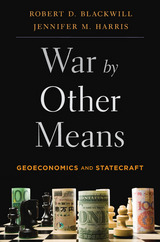
A Foreign Affairs Best Book of 2016
Today, nations increasingly carry out geopolitical combat through economic means. Policies governing everything from trade and investment to energy and exchange rates are wielded as tools to win diplomatic allies, punish adversaries, and coerce those in between. Not so in the United States, however. America still too often reaches for the gun over the purse to advance its interests abroad. The result is a playing field sharply tilting against the United States.
“Geoeconomics, the use of economic instruments to advance foreign policy goals, has long been a staple of great-power politics. In this impressive policy manifesto, Blackwill and Harris argue that in recent decades, the United States has tended to neglect this form of statecraft, while China, Russia, and other illiberal states have increasingly employed it to Washington’s disadvantage.”
—G. John Ikenberry, Foreign Affairs
“A readable and lucid primer…The book defines the extensive topic and opens readers’ eyes to its prevalence throughout history…[Presidential] candidates who care more about protecting American interests would be wise to heed the advice of War by Other Means and take our geoeconomic toolkit more seriously.
—Jordan Schneider, Weekly Standard

Bartlett Jere Whiting, a pioneer and acknowledged master of the lexicography of proverbs, also wrote three seminal articles on general and theoretical aspects of paremiology, the study of proverbs and related speech forms: “The Origin of the Proverb,” “The Nature of the Proverb,” and “The Study of Proverbs.” On the occasion of his ninetieth birthday, friends, students, and colleagues from the Harvard English Department, Whiting’s academic home for nearly fifty years, offer these essential readings to a new generation of scholars and enthusiasts of “the wisdom of many, the wit of one.”
Whiting’s essays are accompanied by an annotated bibliography of his works on the proverb by the best-known contemporary student of the subject, Wolfgang Mieder; and introductory essays by Joseph Harris and Wolfgang Mieder and by Susan E. Deskis place Whiting in the history of international proverb study.
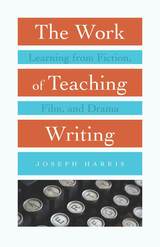
Each chapter examines a fictional representation of writing classes—Dead Poets Society, Up the Down Staircase, Educating Rita, Push, and more—and shifts the conversation from how these works portray teachers to how they dramatize the actual work of teaching. Harris considers scenes of instruction from different stages of the writing process and depictions of students and teachers at work together to highlight the everyday aspects of teaching writing.
In the writing classroom the ideas of teachers come to life in the work of their students. The Work of Teaching Writing shows what fiction, film, and drama can convey about the moment of exchange between teacher and student as they work together to create new insights into writing. It will interest both high school and undergraduate English teachers, as well as graduate students and scholars in composition and rhetoric, literary studies, and film studies.
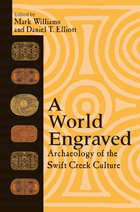
This major summary of the current state of archaeological research on the Swift Creek culture is the first comprehensive collection ever published concerning the Swift Creek people.
The Swift Creek people, centered in Georgia and surrounding states from A.D. 100 to 700, are best known from their pottery, which was decorated before firing with beautiful paddle-stamped designs--some of the most intricate and fascinating in the world.
Comprehensive in scope, this volume details the discovery of this culture, summarizes what is known about it at the present time, and shows how continued improvements in the collection and analysis of archaeological data are advancing our knowledge of this extinct society.
Although they know nothing of Swift Creek language and little about its society, archaeologists have collected valuable information about the
economic strategies of Swift Creek inhabitants. What archaeologists know best, however, is that the Swift Creek people were some of the best wood carvers the world has seen, and their pottery will stand as their lasting legacy for all time. This book presents and preserves their legacy.
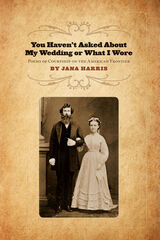
For thirty years poet Jana Harris researched the diaries and letters of North American pioneer women. While the names and experiences of the authors varied, Harris found one story often connected them: their most powerful memories were of courtships and weddings. They dreamed of having a fine wedding while they spent their lives hauling water, scrubbing floors, and hoping for admirers. Many married men they hardly knew.
Based on primary research of nineteenth-century frontier women, Harris uses her compelling poetry to resurrect a forgotten history. She captures the hope, anxiety, anger, and despair of these women through a variety of characters and poetic strategies, while archival photographs give faces to the names and details to the settings. Harris’s meticulous research and stirring words give these pioneer women a renewed voice that proves the timelessness of the hopes and fears of love and marriage.
READERS
Browse our collection.
PUBLISHERS
See BiblioVault's publisher services.
STUDENT SERVICES
Files for college accessibility offices.
UChicago Accessibility Resources
home | accessibility | search | about | contact us
BiblioVault ® 2001 - 2024
The University of Chicago Press









